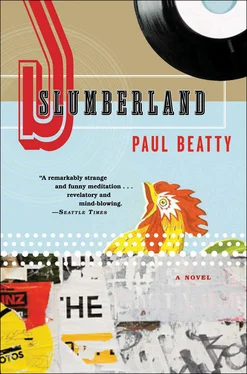The penguin exhibit opened to great fanfare; however, the supposedly sprightly birds refused to perform. People came in droves to see their aquatic grace, but no amount of pleading toddlers or zoological trickery could coax them into the water. I visited my Antarctic familiars every day. Setting my tape recorder in the corner of the exhibit hall and taping the dismay of the visitors who’d paid good money to see the winsome waterfowl.
Like Miles Davis in concert, for the most part the penguins stood stock-still, their backs to the audience. Every few minutes a curious bird would cause a commotion by skating his webbed feet across the ice to the water’s edge. The zoo patrons would rush the railing, lifting the children onto their shoulders and their box cameras to their eyes, then with a squawk the penguin would invariably waddle fearfully back to the pack.
The crowd would turn ugly. They’d pound and spit on glass, cursing the reluctant birds: “Now I know why these things are nearly extinct — these snooty fuckers think they’re too good to get wet!”
At least the penguins had one another. I’d return home alone. Collapse on the couch and listen to my recordings of the day’s events. Reveling in penguin defiance in the face of the curious stares and the stereotyped expectations of the outside world. One day on an overcast autumn afternoon, while on my way to the zoo, I chased down a lone ray of sunshine through the tree-lined streets of Charlottenburg. When I caught up to the sun ray, it shone directly upon the Amerikahaus and nothing else. The Amerikahaus is an ivy-covered building that sits in the middle of a residential street like a cultural trading post and offers fellowships and cultural indoctrination instead of beaver pelts and fire water. Inside the glass-enclosed vestibule, next to the flagpole, stood a black security guard, wiping his hands on Old Glory as if it were a restroom towel dispenser.
In those days, seeing a black face in Berlin was almost as rare as a black field goal kicker in the NFL. And I stared. Stared unabashedly at my fellow human penguin. The tall African-American watchman belonged to the long legacy of freak show blackness including the Venus Hottentot; Ota Benga, the Congolese pygmy displayed as the missing link in the Bronx Zoo; Kevin Powell and Heather B, the first two African-Americans on MTV’s The Real World ; and myself. When the guard spotted me peering at him through the glass, he cheerily waved me inside. I opened the door to his cage. His face was warm, thick, and brown as a wool sock in an L.L.Bean catalog. The creases in his gray uniform were sharp and fell down each pant leg to a pair of polished black combat boots. A set of official-looking keys jangled from a thick steel chain. He didn’t carry a weapon; he disarmed intruders with his smile. I eased in close enough to read the writing on the ID tag; it read, simply, security.
“Can I get an L.A. Times inside?”
“Yeah,” he said. “Usually it’s a few days late, though.”
“That’s cool.” It’d been weeks since my voice had deepened into the What’s happenin’? baritone I reserved for addressing black men whom I didn’t know.
“How long you been on this side, brother? How you like it?” he asked, though before I could answer and lodge my complaints about the coarseness of the toilet paper and bath towels and the puzzling absence of air conditioners and wall-to-wall carpeting, he looked around to see if anyone was listening, then whispered in my ear, “Germany is the black man’s heaven.”
“What?”
“These people know how to take care of you. They treat you like a king. Your wish is their command.”
I stepped away from him cautiously. He was dead serious. I excused myself, and as I backed out of the door he called out after me, “You just have to let them love you.”
A week later, to ease the societal transition of the emperor penguins, the Berlin Zoo brought in a gaggle of the more gregarious rockhopper penguin, and soon the once-uptight emperor penguins were splashing and barrel rolling through the frigid waters of this cold-ass city as if they had heard and heeded the security guard’s advice. You just have to let them love you .
And God, I needed to be loved.
SLUMBERLAND. NO MATTER how tightly I cupped my hands around my eyes, I couldn’t see inside the bar. A hazy red light filtered through the always-drawn bamboo blinds. The window vibrated with the murmur of loud conversation and reggae music. Judging from the rhythm of the shaking window, I guessed that the song was one of my favorite ballads, Aswad’s “On and On,” a deeply respectful cover of Stephen Bishop’s easy-listening hit.
Down in Jamaica . .
I walked into the bar. And indeed, “On and On” was on; I was more than pleased with myself. I felt like a superhero who’d just discovered his powers. The ability to identify a song from the way its backbeat vibrated a windowpane wasn’t going to save the world from alien invasion or a runaway meteor, but I could envision winning some bar bets.
For Berlin, the pub was crowded. There were only two open seats, a stool at the bar and an empty chair at an otherwise occupied table. The Slumberland was a repressed white supremacist’s fantasy. At almost every table sat one or two black men sandwiched by fawning white women. At a strategically located center table, four grinning white men sat voyeuristically watching the bloodlines of their race putrefy. I’d never been in a place more devoid of platonic love. The air was thick with the smell of musk oil, patchouli, and sweat. I had to breathe by taking big fish gulps of air.
The desert-yellow walls were decorated with colorful paintings advertising various African businesses, barbershops that shaved petroglyphs into Cameroonian heads, Namibian eateries, and Senegalese fix-it shops. A white woman coming from the bathroom slithered past and winked at me. I froze like an Eisenhower-era virgin on his first trip to a Tijuana cathouse. No one had ever winked at me before. I didn’t think it was something real people did, and this was a blatant Betty Boop c’mere-big-boy wink come to life. I pretended to be preoccupied with the artwork and turned to the painting nearest me. It was a hand-painted graphic for a Ghanaian herbal center that sold various cure-alls. An asthmatic boy clutched his chest. A bald man, suffering from a painful condition called “kokoo,” squatted on the ground with his back to the viewer, hot brownish-red diarrhea spewing from his watercolor butt like lava. In another section of the painting the word power was underlined by a veiny, rock-hard penis attached to a well-muscled torso whose owner, apparently, no longer suffered from erectile dysfunction.
I sat at the bar and introduced myself to the bartender as the new jukebox sommelier. Doris shook my hand, poured me a scotch the size of which you’d find only in a John Ford western, and told me that the owner, Thomas Femmerling, wasn’t sure when to expect me, but would be happy to see me when he got back from the Canary Islands.
“If he has to listen to ‘Get Up, Stand Up’ one more time. .”
There was no mistaking that wonderfully alluring husky voice. Doris was the same woman who answered the phone when I first placed that long-distance call to the Slumberland.
I took out the envelope the chicken-fucking song came in and asked if she knew anything about it; maybe the writing was familiar.
Doris examined it and beckoned me to look at the postmark.
“This was mailed from East Berlin.”
“So?”
“An East German can’t just mail a package to America. That’s high treason. Whoever mailed it probably works for the government or the Stasi. What was in the envelope?”
Читать дальше












